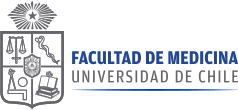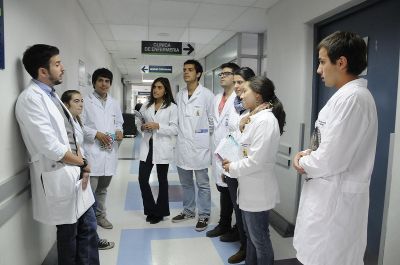Medicine
Founded in 1833, the School of Medicine was the first in Chile to obtain anacademic accreditation for a maximum period, that is seven years. It relies onfive clinical campuses strategically located in the Metropolitan Region. These include important hospitals, primary health-care and family centres, where the next generations of doctors from the Universidad de Chile are trained.
Every year, around 200 professionals graduate from our school. A leader in pedagogical innovation, teaching formation and research, they are committed to the real needs of the country. Because of their strong ethical and humanist curriculum and skills-based training, our students are called to become integral players in solving Chile's major health issues.
More than one thousand professors working in different laboratories, hospitals and community health centres are responsible for teaching, conducting research and carrying out extension activities.
Educational activities focusing on fundamental sciences are carried out through the Institute of Biomedical Sciences ("Instituto de Ciencias Biomédicas" or ICBM) while activities related to public health issues are conducted in the Salvador Allende's School of Public Health, both institutions located at the School of Medicine on Av. Independencia. Educational activities focusing on clinical skills are carried out in five different clinical campuses (Centre, North, West, East and South) located in different hospitals from the Metropolitan Region, community health centres and health services.
- The North Campus is composed of the following institutions: Universidad de Chile's Clinical Hospital, Psychiatric University Clinic as well as Roberto del Río's Children Hospital, some departments in the San José Hospital and the National Institute of Cancer.
- The South Campus includes the following institutions: Hospital Barros Luco Trudeau and Exequiel González Cortés' Children Hospital.
- The Centre Campus includes the following institutions: San Borja-Arriarán Hospital Complex and some clinical departments belonging to the Santiago's Public Emergency Hospital.
- The East Campus includes the following institutions: Hospital del Salvador, National Institute of Respiratory Diseases and Thoracic Surgery, Institute of Neurosurgery, Dr. Luis Tisné Hospital and CDT Cordillera (both located in Peñalolén) and Luis Calvo Mackenna's Children Hospital.
- The West Campus includes the following institutions: San Juan de Dios Hospital and Institute of Traumatology. The CDT Profesor Armas Cruz is also part of that administrative unit.
Outpatient clinical interventions are carried out in several community health centres attached to campus mentioned above (e.g. Juanita Aguirre, Cristo Vive, Hernán Alessandri, Aníbal Ariztía, etc.) as well as in some rural health centres (Colina, San Manuel, among others).

